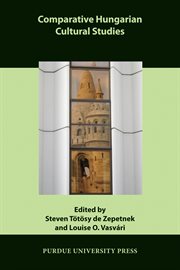Nonfiction
eBook
Details
PUBLISHED
Made available through hoopla
DESCRIPTION
1 online resource
ISBN/ISSN
LANGUAGE
NOTES
The studies presented in the collected volume Comparative Hungarian Cultural Studies -- edited by Steven Totosy de Zepetnek and Louise O. Vasvari -- are intended as an addition to scholarship in (comparative) cultural studies. More specifically, the articles represent scholarship about Central and East European culture with special attention to Hungarian culture, literature, cinema, new media, and other areas of cultural expression. On the landscape of scholarship in Central and East Europe (including Hungary), cultural studies has acquired at best spotty interest and studies in the volume aim at forging interest in the field. The volume's articles are in five parts: part one, "History Theory and Methodology of Comparative Hungarian Cultural Studies," include studies on the prehistory of multicultural and multilingual Central Europe, where vernacular literatures were first institutionalized for developing a sense of national identity. Part two, "Comparative Hungarian Cultural Studies and Literature and Culture" is about the re-evaluation of canonical works, as well as Jewish studies which has been explored inadequately in Central European scholarship. Part three, "Comparative Hungarian Cultural Studies and Other Arts," includes articles on race, jazz, operetta, and art, fin-de-siecle architecture, communist-era female fashion, and cinema. In part four, "Comparative Hungarian Cultural Studies and Gender," articles are about aspects of gender and sex(uality) with examples from fin-de-siecle transvestism, current media depictions of heterodox sexualities, and gendered language in the workplace. The volume's last section, part five, "Comparative Hungarian Cultural Studies of Contemporary Hungary," includes articles about post-1989 issues of race and ethnic relations, citizenship and public life, and new media
Mode of access: World Wide Web







